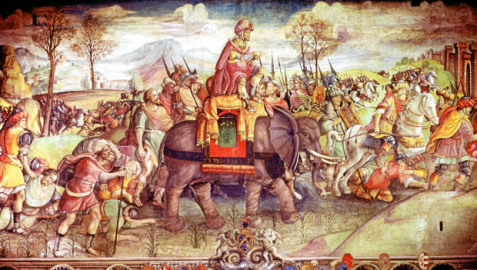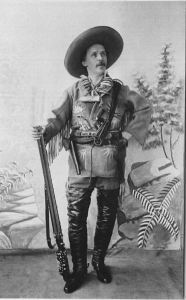Andreas Kluth's Blog, page 4
June 10, 2012
Ich bin ein Berliner

I)
In the late 80s, when we still thought the Iron Curtain and the Berlin Wall were as good as eternal, my friend Matt Lieber and I, fairly fresh out of high school, traveled around Germany and got a visa for a few unforgettable hours in Communist East Berlin. We entered through Checkpoint Charlie (pictured above in 1961, during one of the many standoffs). Then we walked up the famous Friedrichstrasse toward the equally famous Unter den Linden.
I’ll never forget those first few blocks behind the Iron Curtain.
Crosstreets:
Krausenstrasse
Leipzigerstrasse
Kronenstrasse
Mohrenstrasse
Taubenstrasse
II)
Just a few years later, in 1993, I was back on that same stretch of that same street: Friedrichstrasse, between Taubenstrasse and Mohrenstrasse.
Except this time I was an unpaid intern for CNN, that (then-) unbeatable American, Western, Capitalist media success story. By sheer luck, n-tv, a German start-up that wanted to be, and indeed became, the German CNN, had just opened in the same building and CNN owned a part of it. In the utter chaos of n-tv‘s first weeks, I did all sorts of jobs for both companies that I was entirely unqualified for and benefitted hugely from.
III)
Now, many years later again, I will be back once more at that same stretch of that same street. This time (as of mid-June, 2012) I am Berlin Bureau Chief of The Economist. Our office is right at a corner that Matt and I walked past all those years ago.
It’ll be my fifth beat in the 15 years I’ve worked for The Economist so far. (You may recall my meditation on being that kind of “generalist” when I last switched beats, three years ago.)
IV)
When I visited the office the other day, before the actual move from Los Angeles, I loitered a bit on those blocks, looking for something familiar from the past.
Wasn’t this where that East German cop stopped Matt and me for jaywalking?
And wasn’t that where, in 1993, that god-awful East-Germanesque sausage snack bar was?
I simply couldn’t tell. Yoga, Starbucks, Gucci, banks, BMWs. Physically, the street had become aggressively 2012, and nothing else.
I remembered how somebody once told me about visiting, in 1978, a tiny fishing village north of Hong Kong. It was called Shenzhen. Three decades later he went back to try to find the spot where he stood. Well, you know.
But even that did not capture the feelings I had while standing again at that particular corner of the world. In my imagination, I rewound and fast-forwarded through life on that spot. From its Slavic time through its Prussian time, to its Wilhelmine and Twenties time, its Nazi time, its Cold-War time, its Wende time. Then I opened my eyes again.
V)
Why do people become journalists? For different reasons. But many, I am guessing, want to feel that they lived history.
This year and in the coming years, Europe seems likely to be making history again, and Berlin seems likely to play a big role in that history. If I do my job right, and even if I just do it mediocrely, I’ll see a good bit of it up close.
Filed under: History, The Economist Tagged: Berlin, Germany, journalism








April 27, 2012
The Globe and Mail reviews Hannibal and Me
The reviews are still trickling in. The latest is in The Globe and Mail, one of the big Canadian newspapers. Reviewer Harvey Schachter concludes:
The book is a fascinating, illuminating look at careers through the prism of Hannibal’s life and the other people Mr. Kluth weaves in. His writing is seamless, the ideas provocative, and the book may offer you insights about your own career and life journey so far, as well as what lies ahead.
Thank you, Harvey!
Filed under: Books, Hannibal and Me Tagged: Book reviews, Reviews, The Globe and Mail








April 4, 2012
How I came to the Apache

Courtesy Jerold Altaha
My piece in The Economist this week is about Native Americans, and in particular about the puzzling concept of their national "sovereignty" as individual tribes.
I had a great time researching this one, mainly because I ended up visiting the White Mountain Apache tribe in remote Arizona. Above you see them in their traditional Crown Dance.
But why did I got to the Apache? I could have chosen from 334 reservations and 565 tribes.
Well, there were a couple of reasons, some journalistic, others logistical. Also, just getting an interview with any tribal leader can be difficult — the tribes have been burnt so often by us whites, including by white hacks, that they don't trust any of us. As Ronnie Lupe, the chairman (≈ chieftain) said to me:
"We see a white man snooping around, we all have the same thought: is he good or bad?"
I was the one snooping around.
But this post is really about the other reason why I chose the Apache, which is meant to be a bit frivolous and yet sentimental.
You see, it's because I, a dual citizen, was once a … German boy!
All about Winnetou
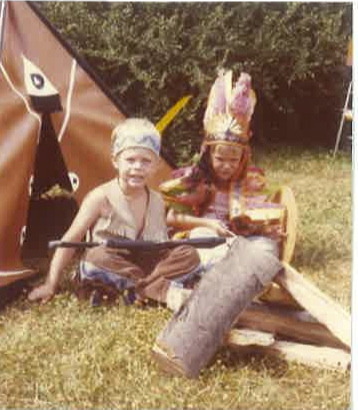
Being a German boy means, statistically, being very likely to be obsessed with American Indians in general and the Apache in particular. Let's just take my case.
In this grainy shot above from the mid 1970s, my friend Patrick and I (left) happened to be Sioux, Cheyenne or Arapaho. This is obvious from the:
teepee (not wigwam or wikiup), and
feathers
You see, we German boys took take these details quite seriously. When playing, one just does not mix genres between, say, the Iroquois/Mohawk and the Great Plains or southwestern tribes. God forbid.
But most of the time we did not wear feathers. Instead, Patrick and I looked more like this:
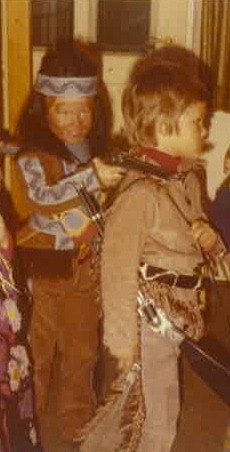
Here Patrick is dressed as Old Shatterhand and I (left again, with wig and paint) am the Apache chief Winnetou. (Our moms made the outfits, since you ask.)
Who are Winnetou and Old Shatterhand? I will tell you. But first, here is how we imagined them:
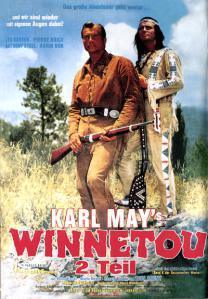
Click for credits
This is a poster for one of the Winnetou films that we were watching in the 70s. Here you see them, the two enemies-turned-blood-brothers and best friends, Old Shatterhand and Winnetou. To us, they were the noblest heroes.
See if you can spot how Patrick and I tried to approximate the look of the characters (played by Lex Barker and Pierre Brice).
But long before those films, German boys had been reading the novels. They were written by Karl May, perhaps the best-selling German author of all time. (Take that, Luther, Mann, Nietzsche, …)
May died 100 years ago this year and never left Germany. But in his imagination he dreamed up exotic worlds and heroes that have enthralled millions since. The best comparison I can think of for you Anglo-Saxons is this: Karl May was really Germany's J.K. Rowling.
Here he is dressed as he imagined Old Shatterhand:
In any case, what does any of this have to do with my research for this week's article?
Well, boys become men, and then sometimes foreign correspondents, based in the southwest. But they're still boys.
I knew my story was fundamentally about a tragedy: the context and background is always the poverty, unemployment, alcoholism, diabetes and crime that is the fate of so many Native Americans on reservations. I was determined to see that reality, and yet to see, in my mind's eye, another reality at the same time.
As I drove through the Salt River Canyon (picture the Grand Canyon but without people) to enter the vast Apache reservation I was of course imagining Winnetou again. Perhaps I was Old Shatterhand this time, riding to meet my friend.
Filed under: Books, The Economist Tagged: American Indians, Apache, Karl May, Native Americans, Winnetou








March 28, 2012
A timeless story: Plutarch > Böll > us

Heinrich Böll (click for credits)
Let's have a few minutes of fun tracing the genealogy of a story to illustrate the concept of archetypes — the Jungian idea that we tell each other the same timeless stories again and again, in infinitely many variations.
(My book is based on that idea: namely, that we see ourselves in the stories of others, whether they lived 2,000 years ago or 2 years ago, or whether they lived at all.)
On pages 140-142 of Hannibal and Me, I tell two versions of a short story. (This is the very end of the chapter called Tactics and Strategy in Life, which is about the fiendish difficulty of telling ends from means in life and the consequences of getting it wrong, as I hinted in this post for the Harvard Business Review.)
So I end the chapter with this:
A few years ago, one of those chain-letter emails landed in my inbox. It told the story of a fisherman who was lying in the warm afternoon sun on a beautiful beach, with his pole propped up and his line cast out into the water. An energetic businessman walked by.
"You aren't going to catch many fish that way," said the businessman to the fisherman. "You should work harder."
The fisherman looked up and good-naturedly asked, "And what would I get for that?"
The businessman replied that he would catch more fish, sell them for more money, save the surplus, and invest in a boat and nets, which would let him catch even more fish.
Again the fisherman asked, "And what would I get for that?"
Somewhat impatiently, the businessman explained that he could then reinvest the even greater surplus and buy more boats and hire staff, becoming a small business and catching ever more fish.
Again the fisherman asked, "And what would I get for that?"
Now the businessman lost it. "Don't you understand that you can become so rich that you never have to work for a living again? You could spend the rest of your days sitting on this beach, just enjoying this sunset!"
The fisherman's eyes lit up. "And what do you think I'm doing right now?"
In the chapter, I then go on to tell another, and much, much older version of that story, which I'll repeat in a minute. But here is what my cousin Bettina realized the other day as she was reading the above passage in my book: The story I was retelling from a chain email in fact derives from a short story by Heinrich Böll, the Nobel-Prize winning giant of postwar German literature.
Böll's story, written in 1963, was titled:
Anekdote zur Senkung der Arbeitsmoral
I love that sardonic mock-bureaucratic tone. It translates into something like:
Anecdote for the Diminishment of the Work Ethic
Here is the German text, very simply and beautifully written. The Wikipedia page tells me that
The story, with its several adaptions, has been circulated widely on the Internet, and has been quoted in many books and scholarly papers. In one of the most popular versions, the tourist is an American (an MBA from Harvard in some versions), and the fisherman is Mexican.
Clearly, Böll's story has a timeless kernel. So where might Böll himself have gotten the idea? (And by the way, he may not have realized where he got it, for we usually do not recall what influenced our ideas.)
Well, I think he got it from a story written about 2000 years ago about events more than 300 years before that. The author was Plutarch. The story was about Pyrrhus, the one who gave us "Pyrrhic Victories".

You can compare it to the original here. But on page 141 of my book, I retell it this way (with anything in quotation marks directly sourced from Plutarch):
Pyrrhus was making preparations to invade Italy and attack Rome when Cineas struck up a conversation.
"The Romans, sir, are reported to be great warriors," said Cineas. "If God permits us to overcome them, how should we use our victory?"
"But that's obvious," said Pyrrhus. "We will be 'masters of all Italy' with all its wealth."
"And having subdued Italy, what shall we do next?" asked Cineas.
"Sicily," replied Pyrrhus without missing a beat. "A wealthy and populous island, and easy to be gained."
"But will the possession of Sicily put an end to the war?" asked Cineas.
"God grant us victory and success in that," answered Pyrrhus, "and we will use these as forerunners of greater things; who could forbear from Libya and Carthage then within reach?" Once we have those, will anybody anywhere "dare to make further resistance?"
"None," replied Cineas, which leaves us to "make an absolute conquest of Greece. And when all these are in our power, what shall we do then?"
Pyrrhus smiled and said, "We will live at our ease, my dear friend, and drink all day, and divert ourselves with pleasant conversation."
"And what hinders us," said Cineas, "from doing exactly that right now, without going through all these troubles?"
Pyrrhus suddenly looked "troubled" and had no answer. Then he went ahead and invaded Italy anyway — without success.
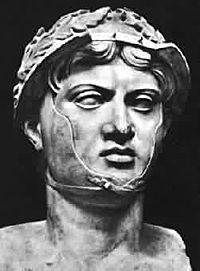
Filed under: Books, Hannibal and Me, History, Life, Story-telling Tagged: Heinrich Böll, Plutarch, Pyrrhus








March 24, 2012
Some of the titles that could have been
One of my habits is, sporadically, to go through old stuff in order to throw most of it away and be reminded of the few nuggets worth preserving.
As I was doing that, I came across a little Post-it note on which I seem to have scribbled, at some point over the past four years, ideas for titles and subtitles for my book, to be discussed with my editor. (As you can see from the older posts with the tag "titles", it was on my mind for a long time.)
Here are the ones just on that particular Post-it note:
Hannibal and You: Uncovering the mysteries of success and failure in our lives
Reversal: Triumph and disaster in life, from ancient times to today
The two impostors: Tracing the mystery of triumph and disaster from antiquity to our own lives
The Hannibal Archetype: The eternal mystery of triumph and disaster in life
Hannibal's riddle: The mystery of success and failure in life
When Hannibal met Scipio: The mystery of success and failure in our lives
The Hannibal Challenge
In the end, of course, the publisher chose the title and subtitle you see on the jacket on the right, and at the top of this blog. What would you have chosen?
Filed under: Books, Hannibal and Me, writing Tagged: titles








Michael Stürmer’s review
Michael Stürmer, a high-profile German columnist and historian, has written a great review of Hannibal and Me in Die Welt.
It’s in German, but I’ll translate a few bits. (Those of you who can may fact-check me.  )
)
… It’s a brilliant hybrid-study, in the genre of the moral biographies of older times…
What was — this is the recurring question — the secret of success within both triumph and disaster?
… After 300 pages, conclusions are drawn. These are politically incorrect in that they extrapolate from the art of war to life. The most important: Remain calm when others flounder. Never confuse ends and means, strategy and tactics. Whether young or old, have young ideas. But cultivate, even while young, old (and old-fashioned) discipline.
When misfortune comes, react at first as Fabius Cunctator did, and then as Scipio did…. Success depends on how you define it. See the best in people but protect yourself against the worst in them. Success means becoming a mensch. Do what you must do with equanimity.
But enough propaganda. I was just going through some old files and found something amusing. Let me tell you in another post….
Filed under: Books, Hannibal and Me Tagged: Book reviews, Michael Stürmer, Reviews








Michael Stürmer's review
Michael Stürmer, a high-profile German columnist and historian, has written a great review of Hannibal and Me in Die Welt.
It's in German, but I'll translate a few bits. (Those of you who can may fact-check me.  )
)
… It's a brilliant hybrid-study, in the genre of the moral biographies of older times…
What was — this is the recurring question — the secret of success within both triumph and disaster?
… After 300 pages, conclusions are drawn. These are politically incorrect in that they extrapolate from the art of war to life. The most important: Remain calm when others flounder. Never confuse ends and means, strategy and tactics. Whether young or old, have young ideas. But cultivate, even while young, old (and old-fashioned) discipline.
When misfortune comes, react at first as Fabius Cunctator did, and then as Scipio did…. Success depends on how you define it. See the best in people but protect yourself against the worst in them. Success means becoming a mensch. Do what you must do with equanimity.
But enough propaganda. I was just going through some old files and found something amusing. Let me tell you in another post….
Filed under: Books, Hannibal and Me Tagged: Book reviews, Michael Stürmer, Reviews








March 9, 2012
Overlapping lessons: Hannibal and Me & The Big Five
Admittedly, this one might be all Greek to you — or rather all German, because that's what we were speaking.
Uwe Alschner, who evangelizes the "Big Five for Life" concept in Germany (a guide to more purposeful living), had a great Skype chat with me about Hannibal and Me. (And the book's not even been translated into German yet.)
Thanks, Uwe!
Filed under: Books, disaster, Hannibal and Me, success, triumph Tagged: Big Five for Life, Uwe Alschner








March 5, 2012
Green-to-tee Strategy, and other fun
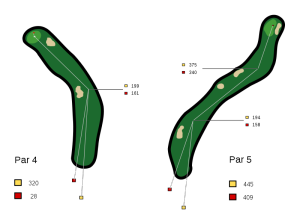
"For smart, talented, and ambitious people, winning is sometimes so easy that it makes true success elusive. That's because victories, easily obtained, can obscure the ultimate goal."
That's a quote out of Hannibal and Me, Chapter 6, which is about life strategy. It's also how I open my latest "teaser" post in the Harvard Business Review. It segues, as one does, from Hannibal in 216 BC to Carl von Clausewitz to, yes, Tiger Woods. 
It's all about strategy, you see — about thinking backwards, from the green to the tee, no matter what the life situation happens to be. (Thank you to Ryan D., who suggested this angle last time.)
Meanwhile, Doug Desalles and I had a great chat on his cool radio station in Sacramento, Radio Parallax. It's about a half hour long, but we really go quite deep towards the end.
Filed under: Books, Hannibal, Hannibal and Me, success Tagged: Harvard Business Review, Radio Parallax, strategy, tactics, Tiger Woods








February 24, 2012
The Catastrophe of Success, and other fun
"The Catastrophe of Success" is the title of a short, famous essay by Tennessee Williams. I borrowed it as the title of a blog post I wrote for the Harvard Business Review the other day. That post is a teaser for Chapter 8 in Hannibal and Me, titled "The Prison of Success."
(I might follow up with another post for the HBR. Those of you who've read the book: Feel free to suggest topics/themes in the book that could make good teasers in 700 words.)
Meanwhile, the Canadian journo-blogger Kempton did a fun Skype interview with me about the book, and just posted it in four clips on his blog. I'll give you just the first clip below, so head over there and give him some traffic. In the other clips we talk about Eleanor Roosevelt, Liu Shaoqi, and others. (It is obvious that I had just rolled out of bed for this one. Kempton, I promise to shave and comb next time.  )
)

And, speaking of fun YouTube clips, Alex Norwick at USC's Annenberg School of Journalism did the one below. Thanks, Alex!

Filed under: Books, Hannibal and Me Tagged: Alex Norwick, Harvard Business Review, Kempton









